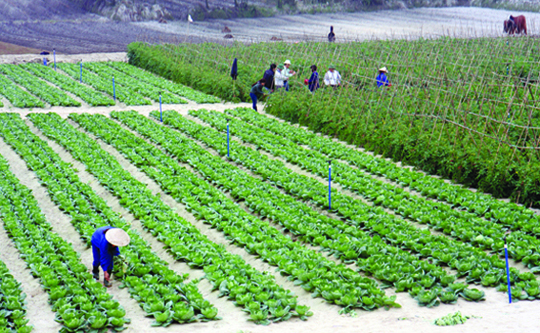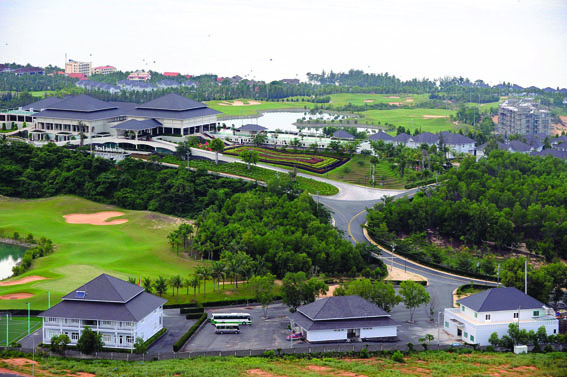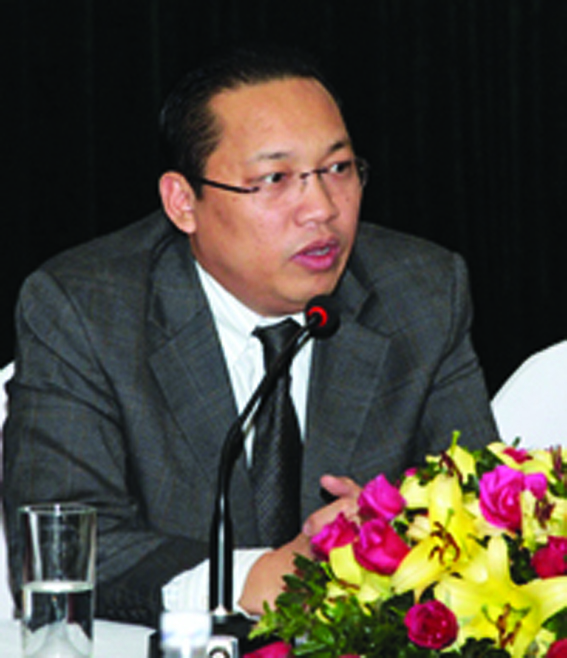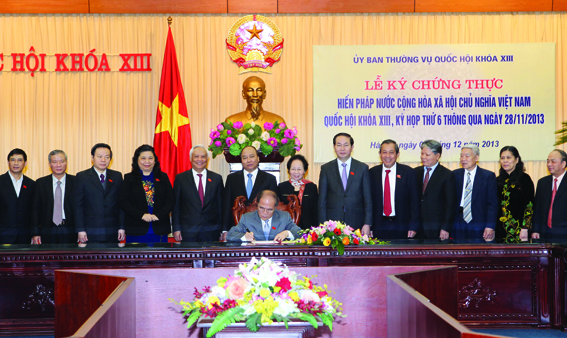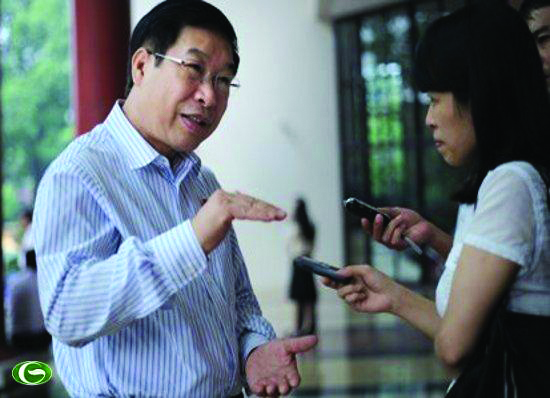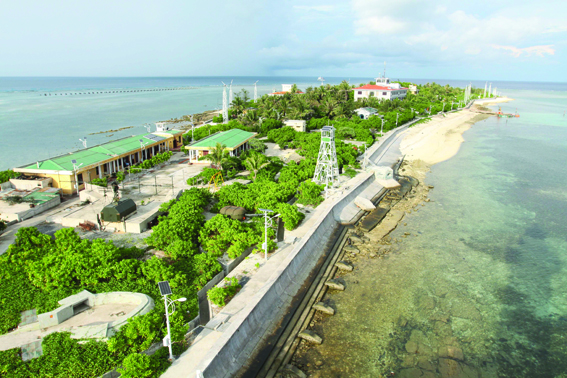More people and organizations, including overseas Vietnamese and foreigners, will be entitled to buy and own homes in Vietnam.
This is one of the key contents of the draft revised Housing Law which were examined by members of the National Assembly (NA) Standing Committee on March 10, the first working day of its 26th session.

Head of the NA’s Law Committee Phan Trung Ly addresses the 26th NA Standing Committee meeting__Photo: Nguyen Khang/VNA
Minister of Construction Trinh Dinh Dung noted that a wider range of, and easier conditions for, overseas Vietnamese and foreign organizations and individuals to buy and own houses in Vietnam aimed to attract talented, resourceful and experienced people for national development and economic integration in compliance with international practices.
Dung stated that there were two main opinions about the house ownership of foreigners in Vietnam. Some agreed with Article 155 of the draft which said “any foreigner who is allowed to enter Vietnam and is keen to own a home in the country will have the right to buy and own it.”
Others suggested stricter requirements for house ownership of foreigners to ensure national defense and security and avoid cases in which foreigners take advantage of the policy to control the domestic housing market.
Chairman of the NA Law Committee Phan Trung Ly said that overseas Vietnamese who were allowed to enter the country basically had the same housing-related rights as Vietnamese living in the country.
Under the draft, foreign organizations allowed to stay and operate in Vietnam can own houses built by housing projects during their valid stay period stated in their investment licenses, while foreigners can own homes for a period of at least 50 years and lease their houses.
Ly reported that the NA Law Committee agreed with the policy allowing more overseas Vietnamese and foreigners to own homes in Vietnam, but emphasized that stringent requirements were also needed, such as disallowing them to buy houses in certain areas or limiting the number of houses or apartments that a foreigner can buy in an area or block.
“It is necessary to verify the impact of offering the extension to foreigners because the country is still struggling to provide sufficient housing for Vietnamese living in the country,” Ly said.
Chairman of the NA Finance and Budget Committee Phung Quoc Hien noted that income and real housing demands should be taken into account while deciding who will be given the Government’s housing support.
Under the draft, beneficiaries of such support include public employees, people with meritorious service to the revolution, the poor and low-income earners. However, Hien said not all of these people faced difficulties in owning or leasing a house, so priority should be given only to those facing difficulties in affording a house.
Hien stated that incentives for housing developers were needed to encourage them to engage more in affordable housing, thus helping meet the rising demands.
Clear regulations were also needed to define the obligations and responsibilities of both investors and people who will benefit from the affordable housing support policy.
Debating the draft Law on Entry, Exit and Residence of Foreigners in Vietnam, lawmakers said the draft needed revisions to make it more practical and feasible.
Specifically, the definition of “foreigner” as one who does not hold a Vietnamese passport should be revised because a foreign visitor can hold dual passports.
Deputies also discussed visa policies proposed for special administrative-economic zones like Phu Quoc island. They asked the NA Defense and Security Committee not to include the proposal of visa exemption for foreigners and Vietnamese nationals holding foreign passports for a less-than-30 day stay on the island because this may conflict with the provisions to be devised for such zones later.
Deputies agreed with the grant of permanent residence permits to foreigners who have lived in the country for 10-15 years.
Nguyen Kim Khoa, Chairman of the NA Defense and Security Committee, asked the drafting board to keep humanitarian considerations in mind and be vigilant about ensuring that the Law’s provisions do not violate the Constitution.
The draft Law on Identification of Citizens prescribes the management of citizens’ identity cards (IDs), citizens’ rights and duties concerning their IDs, responsibilities of citizens’ ID management agencies and prohibited acts.
According to Phan Trung Ly, the citizen identification comprises all information to define a person and is the content on the ID card, adding that the ID card was the document which represented the form of citizen identification.
Deputies asked about the digitalization of citizens’ ID cards to reduce the paperwork for people in dealing with administrative procedures concerning birth certification, household registration, ID cards, passports, personal income tax, social insurance and driver licenses.
NA Standing Committee members agreed to additionally allocate over VND 18 trillion (USD 846 million) from government bonds during 2014-16 for 82 projects which are expected to be completed in 2014-15 and need to be reviewed.
Commenting on the draft Ordinance on Handling of Acts Obstructing Procedural Activities of People’s Courts, lawmakers said the Ordinance is expected to clarify what violations would be sanctioned as well as sanctioning levels and procedures.
In the draft, such violations include acts violating court regulations and orders, failure to obey court summons, threatening officers on duty, obstructing the evidence collection process or wrongly reporting the court’s activities.
The Supreme People’s Court, which is in charge of compiling the draft, proposed that in addition to warning violators, the court’s decision should be sent to organizations and schools where the violators worked or studied and commune-level People’s Committees of the localities where they lived.
Many members of the NA Standing Committee in the Judicial Committee who examined the draft earlier said the draft must be prepared more carefully to better conform to the new Constitution and other laws including the Civil Procedure Code and the Criminal Procedure Code.
At this five-day session, deputies also debated the issues concerning real estate business, state budget, organization of people’s procuracies and people’s courts, notarization, and customs.
It was revealed that the XIIIth NA would convene its seventh session on May 20 to pass 10 laws and two resolutions.
During the month-long sitting, lawmakers will comment on 18 draft laws and devote nearly three days to question-and-answer sessions.
The NA will not conduct votes of confidence. Instead, it will discuss a draft resolution on amendments to Resolution No. 35/2012/QH13 on votes of confidence for holders of positions elected or approved by the National Assembly or People’s Councils.-

